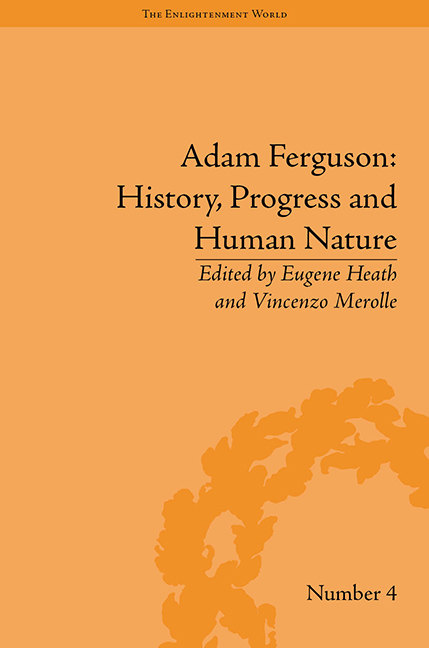Book contents
- Frontmatter
- CONTENTS
- Contributors
- Introduction
- I Life and Works
- II In History
- III On History
- IV Human Nature, Action and Progress
- 9 Ferguson's Politics of Action
- 10 Ferguson and the Active Genius of Mankind
- 11 Providence and Progress: The Religious Dimension in Ferguson's Discussion of Civil Society
- Notes
- Works Cited
- Index
10 - Ferguson and the Active Genius of Mankind
from IV - Human Nature, Action and Progress
- Frontmatter
- CONTENTS
- Contributors
- Introduction
- I Life and Works
- II In History
- III On History
- IV Human Nature, Action and Progress
- 9 Ferguson's Politics of Action
- 10 Ferguson and the Active Genius of Mankind
- 11 Providence and Progress: The Religious Dimension in Ferguson's Discussion of Civil Society
- Notes
- Works Cited
- Index
Summary
From what we have already observed on the general characteristics of human nature, it has appeared, that man is not made for repose. In him, every amiable and respectable quality is an active power, and every subject of commendation an effort. If his errors and his crimes are the movements of an active being, his virtues and happiness consist likewise in the employment of his mind; and all the lustre which he casts around him, to captivate or engage the attention of his fellow creatures, like the flame of a meteor, shines only while his motion continues: the moments of rest and of obscurity are the same.
As the details of his life testify, Adam Ferguson, in all of his roles as academic, minister, soldier and diplomat, was first and foremost a ‘man of action’, and it is perhaps only natural that a man of action should become so preoccupied with the concept of activity. Action lies at the heart of his social thought. His very understanding of human nature is couched in terms of his recognition of its active nature and the interactive nature of the societies in which mankind assembles. Throughout his writings Ferguson considers the theme of action with remarkable consistency and frequency. Drawing from across his works, this essay reconstructs how Ferguson blends descriptive and normative argument to develop his conception of action, as a principle of human nature, into a ‘standard of estimation for mankind’. Ferguson's combination of the descriptive and the normative confronts him with a problem: how can he reconcile his criterion of moral judgement with his growing awareness of the significance of the unintended consequences of social interaction? It will be argued that Ferguson seeks to resolve this question through the development of a concept of national character. Ferguson's discussion of the fall of the Roman Republic illustrates his attempt to utilize a concept of national character or spirit as a means of extending his moral principle to the assessment of social level outcomes. It is to this concept of national character that he attributes moral responsibility for out-comes beyond the active power of individual agents. As a result of this Ferguson maintains that the fate of nations can provide us with moral lessons.
- Type
- Chapter
- Information
- Adam FergusonHistory, Progress and Human Nature, pp. 157 - 170Publisher: Pickering & ChattoFirst published in: 2014



